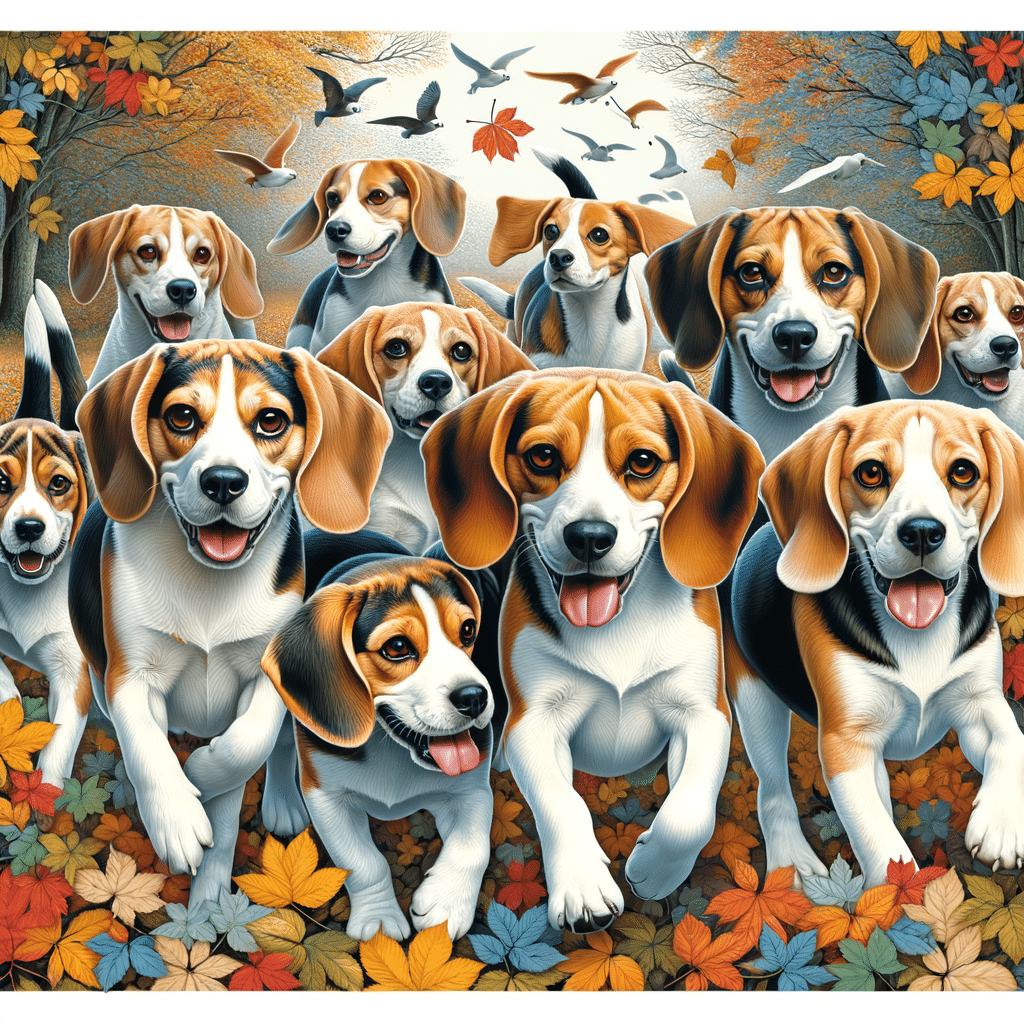Choosing the right dog breed that fits your lifestyle and preferences can be challenging, particularly when the options are as charming and popular as the beagle and the French bulldog. Both breeds have found favor in the hearts of dog lovers due to their unique characteristics and companionable natures.
In This Article
When considering a beagle vs. French bulldog, a comprehensive guide like the one we provide here can give you the necessary information. The beagle has a keen sense of smell and tracking ability, and it was initially bred for hunting purposes. Its friendly disposition and boundless energy make it an excellent fit for families and active individuals.
The French bulldog is a companion dog with its distinctive bat-like ears and sturdy build. This breed is known for its affectionate temperament and adaptability, thriving in various living situations. Apartment residents love its relatively low energy level.
When comparing the beagle and French bulldog, potential owners should consider factors such as activity needs, space requirements, and compatibility with children. To stay happy and healthy, the beagle typically requires more exercise and outdoor activities. In contrast, the French bulldog’s exercise needs are more moderate, making the breed suitable for less active households.
Health considerations also play a critical role, as both breeds have distinct hereditary health issues that require attention and care from prospective owners.
Highlights
- Beagles and French bulldogs make excellent companions but have distinct exercise and space dog care requirements.
- Understanding each breed’s health considerations as an adult and a puppy is imperative to ensure their well-being.
- Beagles suit active lifestyles, while French bulldogs are better suited for less active environments.
Breed Origins and History
The beagle and French bulldog are two distinct breeds that have evolved from their respective origins, England for the beagle and France for the French bulldog, to become internationally popular companion dogs. Each breed has a unique history reflecting their development and societal roles over centuries.
Beagle History
The beagle’s history stretches back to England, where it was a hunting dog with a keen sense of smell and stamina. Originating in Roman times, the modern breed developed in the 18th century for hunting hares and other small game.
The beagle’s popularity rose due to its pack-hunting ability, making it a favorite among English hunters. The American Kennel Club (AKC) recognized the beagle in 1885 and consistently ranks it as one of the most popular breeds in the United States.
French Bulldog History
French bulldogs, sometimes called a Frenchie, have a fascinating and complex history. Emerging in England among lace workers as a smaller version of the English bulldog, the breed came to France during the Industrial Revolution. In France, the dogs evolved, becoming the smooth, affectionate companion dogs we know today. Over time, they were sought after by society’s upper crust and became a symbol of luxury. The AKC officially recognized them in 1898.
Physical Characteristics and Health
When comparing the physical characteristics and health of beagles and French bulldogs, examining their size, weight, coat colors, grooming needs, and common breed-specific health concerns is important.
Size and Weight Comparison
Beagles typically stand taller and leaner than the more compact and muscular French bulldog. While beagles often weigh between 20 and 30 pounds, French bulldogs usually weigh under 28 pounds, with a sturdy build characteristic of the breed. Providing proper dog nutrition is vital to maintaining an ideal weight and health.
Coat Colors and Grooming
Beagles have a short, dense double coat commonly seen in black, white, tan, and red combinations. French bulldogs’ smooth, short coat comes in various colors, including brindle, cream, fawn, and white, with possible patterns and markings.
- Beagles have moderate shedding and require regular brushing to minimize loose hair.
- French bulldogs require less grooming due to their shorter hair but can shed similarly.
Both breeds require routine care, such as nail trimming and ear cleaning, to maintain good hygiene. Dog grooming is necessary, but it doesn’t need to happen as frequently as other breeds.
Common Health Concerns
A beagle and a French bulldog share some common health issues and, due to their distinct physical characteristics, face breed-specific challenges.
- Beagles may suffer from epilepsy, hypothyroidism, and various eye conditions such as glaucoma and progressive retinal atrophy. Concerns like hip dysplasia and patellar luxation can also affect them.
- French bulldogs are a brachycephalic breed, and they are susceptible to conditions such as brachycephalic syndrome, which involves respiratory issues. They are also at risk of spinal and joint conditions like hemivertebrae and intervertebral disk disease.
Owners must know these health issues to provide preventative care and timely veterinary attention.
Temperament and Behavioral Traits
Prospective pet owners should consider the distinctive temperament and behavioral traits of the beagle and French bulldog when comparing them. Beagles are known for their high energy levels and require regular exercise, while French bulldogs are more laid-back and suited for less active lifestyles.
Behavior and Personality
Beagle
- Exercise needs: High; they require daily walks and play to keep them fit and mentally stimulated.
- Personality: Outgoing, curious, and friendly; beagles are known for their joyful and adventurous spirits.
- Training: They are trainable. However, as scent hounds, beagles may get distracted by smells and require consistent training methods.
- Social behavior: They are very sociable with humans and other dogs, though they may display a high prey drive due to their hunting background.
French bulldog:
- Energy level: Low to moderate; they enjoy playtime but tire easily and do not require extensive exercise.
- Personality: Affectionate, laid-back, and alert; Frenchies are known for loving nature and adapting well to various environments.
- Training: Good trainability; they can be taught commands and tricks but may be stubborn sometimes.
- Behavior with strangers: Generally stranger-friendly, though they may be protective until they recognize someone as friendly. Trust the French bulldog temperament, as it is good.
Compatibility with Families
Beagle
- Children: These are excellent family dogs. They are playful and tolerant, making them kid-friendly, but supervision is advised due to their energetic play style.
- Living environment: They are best suited for homes with a yard but can adapt to apartment living if their exercise needs are met.
- Family dynamics: Thrive in active family settings and enjoy being part of group activities.
French Bulldog
- Children: Kid-friendly and affectionate, making them suitable for families, with supervision advised for interactions with younger children.
- Apartments: Well-suited to apartment living due to their lower activity requirements.
- Pet compatibility: They are generally friendly towards other pets if socialized properly, though their prey drive is notably lower than that of beagles.
Considerations for Potential Owners
Potential owners should consider their living arrangements and lifestyle when deciding between a beagle and a French bulldog. Beagles are better suited for active individuals or families thriving in environments where they can explore and play. Due to their high activity needs, they may not be ideal for apartment living unless regular exercise is possible.
On the other hand, French bulldogs have lower energy levels and adapt well to apartment living. They do not require extensive outdoor activities and are content with shorter walks.
Regarding allergies, both breeds have short coats, but beagles are known to shed more, which might concern allergic individuals. Regarding barking, beagles can be vocal, especially if they catch a scent, which could be a consideration for noise-sensitive environments. French bulldogs are less prone to barking, making them relatively quieter companions.
If one intends to have a dog for guarding or protection, neither breed serves as a traditional guard dog, but French bulldogs may show a slightly more protective nature. Regarding costs, both breeds can be quite an investment, with the price for a puppy starting at around $1,000. However, potential owners should also consider the long-term costs associated with their healthcare and maintenance.
Choosing the right dog, male or female, also means evaluating their potential for fighting or aggressive behavior. Both beagles and French bulldogs are generally known for their friendly demeanor, but individual temperaments may vary, and socialization is key.
Lastly, prospective owners must assess the time and resources they can dedicate to training. Both breeds may display stubbornness, though they can be trained effectively with patience and consistency.
Frequently Asked Questions
This section addresses common queries regarding beagles and French bulldogs’ differences and unique traits.
What are the temperament differences between beagles and French bulldogs?
Beagles have a joyful, adventurous spirit and are great with children. French bulldogs are also affectionate and suit first-time dog owners well with an agreeable nature.
How do the sizes of beagles and French bulldogs compare?
Beagles are small to medium dogs, usually 13 to 15 inches tall at the shoulder. French bulldogs are smaller, 11 to 12 inches tall, and known for their stocky, compact build.
What are the expected health concerns in beagles and French bulldogs?
Beagles are generally healthy but prone to conditions like epilepsy and hip dysplasia. French bulldogs face risks such as brachycephalic syndrome due to their short faces. They can suffer from spine malformations.
How much exercise do beagles and French bulldogs need?
Beagles require regular exercise to manage their energy levels, and they often thrive with active families. French bulldogs need moderate exercise but less intensity due to their risk of respiratory issues.
What are the characteristics of beagle and French bulldog mixes?
Mixes of beagles and French bulldogs may display a combination of traits, often resulting in a playful, social dog with moderate exercise needs and an adaptable size.
Do beagles or French bulldogs require more grooming?
Beagles have short coats that require minimal grooming, while French bulldogs have low-shedding coats that require minimal grooming. Both breeds will benefit from regular nail trims and ear cleanings.






